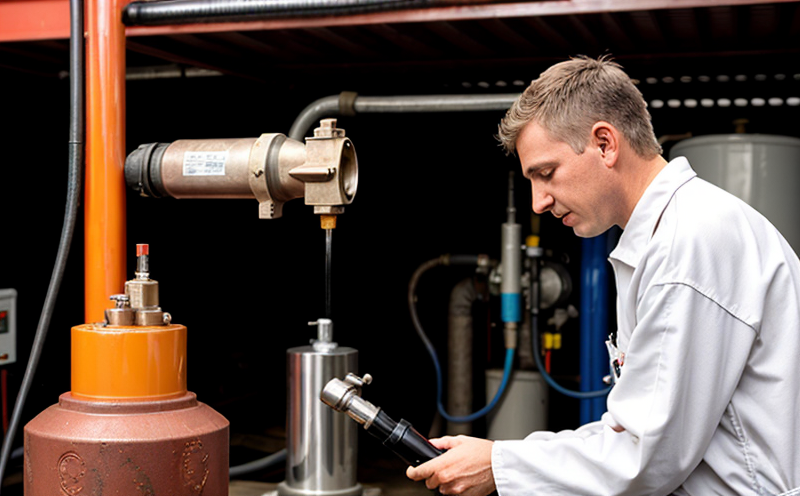ASTM D1319 Hydrocarbon Composition Testing of Jet Fuels
The ASTM D1319 method is a critical standard used to determine the hydrocarbon composition of jet fuels, ensuring their quality and compliance with industry standards. This test is essential for quality managers, compliance officers, R&D engineers, and procurement teams in the aerospace and aviation sectors.
Jet fuel must meet stringent specifications set by organizations like ASTM International to ensure reliable performance across a wide range of conditions. The hydrocarbon composition directly impacts the fuel's viscosity, flash point, and overall combustion efficiency, all factors critical for aircraft safety and operational reliability.
The process involves several steps: sample preparation, distillation under controlled conditions, and analysis via various analytical techniques such as gas chromatography with flame ionization detection (GC-FID). The primary goal is to identify the boiling range fractions of hydrocarbons present in jet fuel, which provides insights into its suitability for specific aircraft engines.
The ASTM D1319 method is part of a broader suite of tests used to evaluate jet fuel quality. These include assessing density, viscosity, and other physical properties, but the hydrocarbon composition test specifically addresses the chemical makeup that affects performance. This detailed analysis helps in diagnosing potential issues before they affect engine operation or lead to operational disruptions.
Real-world applications of this testing method are numerous. For instance, during the development phase of new aircraft engines, understanding the exact hydrocarbon composition can help refine fuel blends for optimal performance and efficiency. In maintenance and operations, regular testing ensures that jet fuel meets current standards, thereby avoiding costly downtime and safety risks.
The test's accuracy is paramount; deviations from specified values could lead to suboptimal engine performance or even failure. Therefore, using reliable laboratories with expertise in this area is crucial. Laboratories like Eurolab have the necessary facilities and personnel to perform these tests accurately and consistently.
Understanding the significance of ASTM D1319 in the context of aerospace and aviation testing provides a clearer picture of its importance. It underscores the need for meticulous quality control measures, especially given the high stakes involved in ensuring safe and efficient air travel.
Eurolab offers unparalleled expertise in ASTM D1319 hydrocarbon composition testing of jet fuels. Our advanced facilities and experienced team ensure precision, reliability, and consistency in test results. Here are some key advantages:
- State-of-the-Art Facilities: Equipped with cutting-edge technology that guarantees accurate and precise results.
- Experienced Personnel: Our staff is well-versed in the latest testing methodologies, ensuring top-notch quality.
- Comprehensive Reporting: Detailed reports provide comprehensive insights into the hydrocarbon composition of jet fuels.
- Global Recognition: Eurolab's results are accepted worldwide due to our adherence to international standards like ASTM and ISO.
We pride ourselves on delivering services that meet and exceed customer expectations. Our commitment to excellence is reflected in the consistent accuracy and reliability of our test results.
Why Choose This Test
- Ensures Safety: By identifying potential issues early, this test helps prevent accidents and ensure safe operations.
- Informed Decision-Making: Understanding the hydrocarbon composition aids in making informed decisions regarding fuel blends and engine performance.
- Avoids Downtime: Regular testing ensures that jet fuels meet current standards, reducing the risk of unexpected maintenance or operational issues.
- Compliance with Standards: This test helps maintain compliance with ASTM International and other relevant regulatory bodies.
The importance of this test cannot be overstated. It plays a vital role in maintaining the integrity of jet fuels, which are critical for the safe and efficient operation of aircraft.
Quality and Reliability Assurance
- Consistent Results: Our laboratory uses standardized procedures to ensure consistent results across all tests.
- Precision Instrumentation: Employing advanced equipment guarantees accurate measurements every time.
- Detailed Documentation: Comprehensive documentation ensures that each test is traceable and reproducible.
- Independent Verification: Our results are independently verified by third-party organizations, adding credibility to our findings.
Aerospace and aviation industries demand the highest standards of quality and reliability. Eurolab's commitment to these principles ensures that every test we conduct meets or exceeds these expectations.





